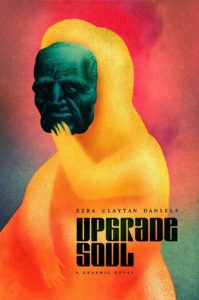Upgrade Soul by Ezra Claytan Daniels
Lion Forge, 2018
ISBN-13: 9781549302923
Available: Paperback, Kindle, comiXology, iTunes app
Hank and Molly Nonnar decide to go through an experimental rejuvenation procedure to celebrate their 45th anniversary, a procedure which will allegedly revive their aging cells and restore vim and vigor. However, the results are not what they expect. Dr. Kenton Kallose, the lead scientist in this endeavor, isn’t completely honest with them about how things will, and do, pan out. As they discover the process is not so much rejuvenation as it is cloning, and they make more disastrous revelations along the way. Their clones, Henry and Manuela, who are both superior to their originals, are left physically deformed after the process. As both originals and clones navigate through their new lives, they realize that not all of them can survive.
Hank and Molly’s story is told in the present, as well as in flashbacks that give the reader the history of how they heard about the experimental procedure and the questions they faced as they made their mutual decision. The story is thought provoking and leaves readers with questions of their own about identity, facing the aging process, ethics, and more. I read it multiple times and each time discovered something I missed in previous reads.
It isn’t a story for the faint of heart.
There were a few things I did not know about the graphic novel prior to reading the physical copy I received at the 2019 American Library Association conference, signed by the creator (Ezra is super nice—if you have the chance to meet him, do it). I did not know this was developed and released by Erik Loyer as an app in 2012. I recently downloaded it and viewed the first chapter for free. It’s beautiful. The soundtrack provided by Alexis Gideon is incredible. It is available for purchase from Bandcamp as a digital download or on vinyl, including a signed copy by Ezra, here: https://fperecs.bandcamp.com/album/upgrade-soul. I found myself lingering in certain sections until the pieces played out. Navigating through the app is very smooth, and the 3D effects add so much to the story. I encourage readers to explore it. You can unlock the entire book for $7.99 here: https://apps.apple.com/us/app/upgrade-soul/id549051057. See a preview of the app here: https://youtu.be/14CPAXh3NYA. Highly recommended
Reviewed by Lizzy Walker
Check out my interview with Upgrade Soul creator Ezra Claytan Daniels.







Follow Us!